Items
Tag is exactly
Vaccine
-
2024-03-09
A Trip to the Algarve
In October 2021, my wife and I went to Portugal for two weeks. It was our first trip since the start of the COVID-19 pandemic. We went to the southern coast of Portugal, the Algarve. Our purpose was a reconnaissance with an eye to relocation. We'd been toying with the idea of moving overseas for several years. Spain had long been at the top of our list––we spent almost three months in Andalusia a decade earlier and fell for the place––but the Spanish tax and import regulations were a bit difficult, so we looked next door to Portugal. Portugal had inviting tax and import regulations. By that October, Portugal's COVID-19 travel restrictions had eased. You just had to have up-to-date vaccines and documentation of a recently conducted, negative test. That was easy enough, so the time was right for getting on a plane. The more difficult thing was returning to the United States. For that, we had to get another COVID-19 test within hours of travel, it had to be of a certain type, and it had to be administered and certified by an approved agency. Fortunately, a company had cracked-the-code on meeting the requirements through online monitoring of a self-administered test. We bought and took with us three tests each––backups to the backups. The strangest-feeling part of the whole trip was the hours-long layover in Newark on the outbound leg. People were walking around without masks on, and we reluctantly took our masks off to eat. We had both received boosters of the Moderna vaccine, but we felt naked and vulnerable. We left our masks on throughout the flight. After landing in Lisbon, we got our rental car and drove a couple hours to Albufeira. It's a coastal town about dead-center on the southern coast. We stayed in a house, which we rented because we wanted to make our own meals. Portugal is not much of a culinary destination––the best meal we had in a restaurant was a simple margherita pizza. On top of that, we are vegetarians, and my wife has a shellfish allergy, neither of which works well in a food culture based upon seafood and pork. Also, because this was a reconnaissance with an eye to establishing residence, it was important to shop around and see the pricing and availability of goods. An unexpected opportunity to do some shopping came early in the trip. My wife and I had packed for the typical Algarve weather for this time of year: cool, windy, occasional rain. Instead, what we got was very hot and very dry. So, it was off to the mall to reconfigure our wardrobe. We found that we dislike Portuguese malls just as much as we dislike American malls. But we like beaches and long hiking trails, and the Algarve coastline has plenty of that. This is where Portugal shines: miles and miles of walkable beaches, and miles and miles of coastal trails. Our days were spent driving to, and then walking trails and beaches at, coastal destinations along the entirety of the Algarve coastline. We also like friendly people, and the Portuguese are definitely that. My wife and I have travelled extensively, typically staying in each destination a month or more, and the Portuguese are at the top of the friendliness scale. Two days before our departure, we took the US-mandated COVID-19 tests. We logged into an online teleconference system and self-administered our tests at the direction of a talking-head on the screen of our laptop computer. We both received negative test results, which we forwarded to the airline. Then we drove to Lisbon, where we spent our last two nights in a downtown hotel. We walked around the city for hours, quickly discovering that we had arrived on one of Portugal's many holidays. But we were impressed by Lisbon as a city that felt safe and walkable, much unlike typical American cities of similar size. Our return flight was easy on the Portuguese end. On the American end, we met the lines and discourtesy typical of the US customs process. Then we caught a connecting flight to Richmond, Virginia, and from there drove a couple late-night hours to our house in Tidewater Virginia. A year after this trip, we moved to Portugal. As I type this, we have been residents for seventeen months. We currently live in the Algarve, a twenty-minute drive from the house we rented in 2021. The long beaches and friendly people more than made up for the bland food and the trip to the mall. -
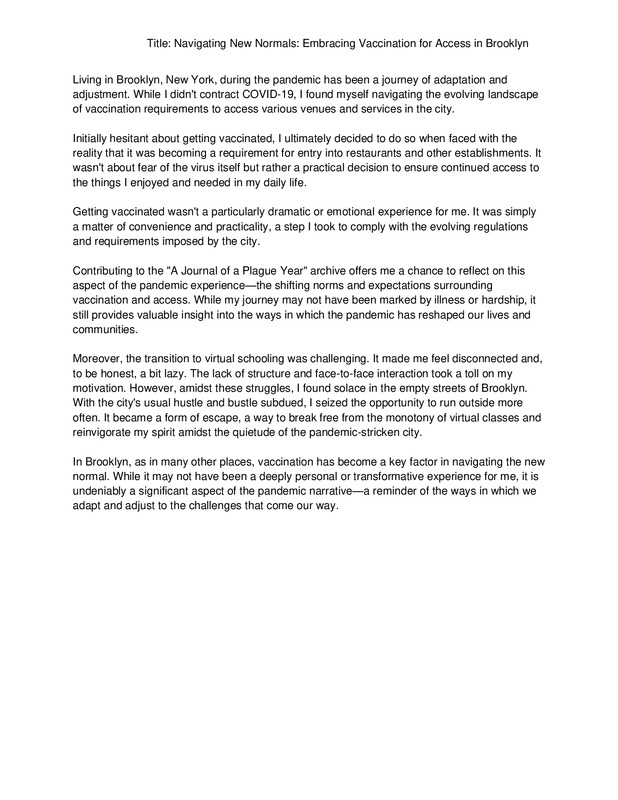 2020-07-07
2020-07-07Title: Navigating New Normals: Embracing Vaccination for Access in Brooklyn
This shows my point of view and experience to the pandemic -
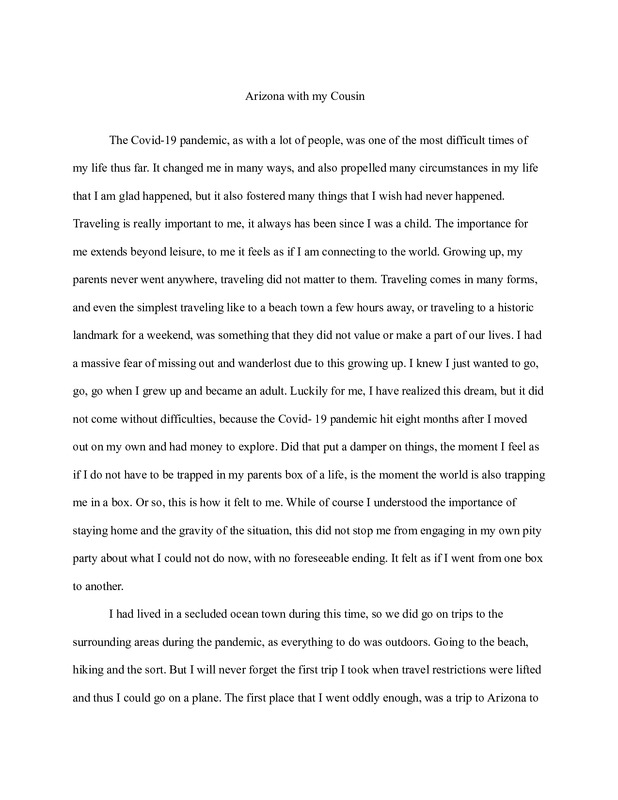 2021-05-20
2021-05-20Arizona with my cousin
This is a story about the first time I traveled post COVID restrictions lifting. This story comments on how isolating the pandemic felt to many of us and thus the importance of traveling once we were able to. This particular story is important to me because it was the first trip I had taken by myself as a newly moved out adult. -
2021-07-01
Falling In Love With Chicago
As the world slowly emerged from the grip of the COVID-19 pandemic, life began to regain a semblance of normalcy. With restrictions lifting and vaccinations becoming widely available, my family eagerly embraced the opportunity to reunite with loved ones and explore the world beyond the confines of our home. After our children became eligible for the COVID-19 vaccine, my husband and I decided to embark on a memorable journey to visit family in Chicago. The decision was influenced by the fact that Illinois had taken the pandemic seriously, and the situation seemed relatively stable. The excitement in the air was palpable as we packed our bags and set off on the adventure. The journey itself became a testament to newfound hope and optimism, a stark contrast to the anxiety-ridden days of lockdown. The rhythmic hum of the Amtrak train and the gentle swaying of the carriages created a soothing backdrop to our anticipation. After almost three days on the train, we finally reached our destination. As we settled into the rhythm of Chicago life, we found ourselves enchanted by the city's rich history and vibrant culture. The streets echoed with the footsteps of generations past, and the architecture told stories of resilience and progress. Our children's eyes widened with each new discovery, absorbing the lessons of the past and the beauty of the present. The museums became classrooms, and the parks transformed into playgrounds of learning and exploration. From the towering skyscrapers to the serene shores of Lake Michigan, Chicago opened its arms wide, inviting our family to immerse ourselves in its tapestry of experiences. Over the course of two weeks, we marveled at the diversity of the city, the pulsating energy of its neighborhoods, and the friendliness of its people. The world-class museums, the iconic Millennium Park, and the deep-dish pizzas became integral parts of our family's collective memory. The reluctance to leave grew with each passing day, as Chicago had become more than a destination; it had become a second home. The connections made, the lessons learned, and the memories forged painted a picture of a city that had welcomed our family with open arms. As we boarded the Amtrak train to return home, a mixture of gratitude and nostalgia-filled our hearts. Chicago had been a beacon of joy and discovery during a time when the world needed it most. The journey had not just been about a visit; it had been a transformative experience, a reminder that even in the face of adversity, there was always the possibility of finding beauty, connection, and a sense of belonging. The trip to Chicago amid the COVID-19 pandemic symbolizes a shift from a period of uncertainty and isolation to one of hope, reconnection, and exploration. That being said, the nervousness still set the undertone to the trip. The eligibility and administration of COVID-19 vaccinations mark a significant turning point in our family's ability to travel. It really shows the importance of vaccines as a tool for regaining a sense of freedom and the ability to engage in activities that were restricted during the height of the pandemic. The exploration of Chicago's history, culture, and landmarks communicates our desire for new experiences and rediscovery of the beauty in the world. The trip became almost like a metaphor for the broader human experience of seeking joy, adventure, and learning, even after enduring a period of hardship. As we chose to travel to a location where the pandemic was taken seriously, it is clear the new considerations the pandemic has led families to consider. This almost suggests that communities and regions that take the pandemic seriously create an environment that fosters a sense of safety and encourages responsible travel. We were so grateful to get to travel to Chicago, and it is undeniably one that we will remember forever. -
0023-10-12
Happy Mother's Day 2021
In May of 2021, after nearly eighteen months of being apart, I was finally able to visit my mom and dad in Spokane, Washington. After driving five hours across Washington state, I finally arrived at my parents house. To say the least it was a very emotional greeting. When I arrived we greeted each other with many hugs and tears. Throughout the day we would just give each other random hugs, happy to be together again. My parents live in a retirement community that was very careful and followed the Covid recommendations to keep the residents safe. I was considered an essential worker as a grocery store worker. I didn't want to take the chance of exposing them to the virus since I worked closely with the public until I received the first vaccine. I also have two sisters that live in Spokane and were able to see them too. We still had to wear masks in most areas but that did not matter. Getting the family together, after such a long time, was all my mom could ask for on her special day. Happy Mother's Day. -
2021-06-20
Norrish First Visit to old Home Post Covid
In the timeframe of the slow lifting of restrictions from the Covid 19 pandemic and shutdown, my family and I were less inclined to engage in travel, at least originally, than we had been before the pandemic. The luxury of just having the freedom to meet with local friends and re-engage in the simple pleasure of taking in a movie at the theater or going shopping at the mall were enough. Eventually, desire to see family that had been cut off from us because of the pandemic encouraged me to take the plunge and fly to visit my sister in my boyhood home state of Wisconsin, a place I had not visited in over twenty years. The plane trip itself was a strange mix of familiar experiences such as checking in my luggage and going through airport security combined with new experiences of wearing a mask in the airplane at all times while regularly using hand sanitizer whenever interacting with people or objects potentially infected with Covid 19. Despite being personally vaccinated, the act of traveling in this way felt both isolating and risky. To be masked up while still being in such a confined area as an airplane after the isolation of staying mostly at home for most of a year felt like a flimsy defense against the potential threat from Covid 19. Isolation from one another still seemed to be the new norm for people, with minimal conversations between strangers. Otherwise, the flight itself was uneventful. Once in Wisconsin, my sister and I spent most of the time visiting locations of my childhood. Places such as our former family farm now owned by a distant cousin, or the creek I learned to swim in or the elementary school I had attended before moving away to Arizona, which had been turned into a recycle center that looked more like a dump than a school. Much of our time was spent talking and reminiscing about the past. Essentially reconnecting in person rather than through text messages or the occasional Zoom call. When we traveled to more public locations such as restaurants, a local baseball game, or Fourth of July fireworks, it was apparent that despite health protocols being strictly followed in locations like airports, local mask regulations had been greatly relaxed. While essentially all staff members were wearing masks, the majority of patrons tended to be without masks. While hand sanitizer was available in the restroom, it seemed fewer and fewer people were using it. It was once again a strange combination of familiar experiences such as ordering a meal with the overtone of pandemic restrictions such as staff masks hovering over your shoulder like a ghost, present but less and less substantial. Overall the trip itself was enjoyable, but was mostly an opportunity to reconnect with family while at the same time reassuring myself of the relative safety to be able to travel once again. Eventually, as more restrictions were removed and the increased access to vaccines made Covid 19 less of a fear and more of a nuisance, other family trips to tourist destinations such as San Francisco or Disneyworld became once again a normal part of travel for myself and my family. But my first trip after restrictions began to relax, there was definitely a reminder that the reality of Covid still hovered over our heads, even as we began to move closer and closer to new normal in our post-Covid world. -
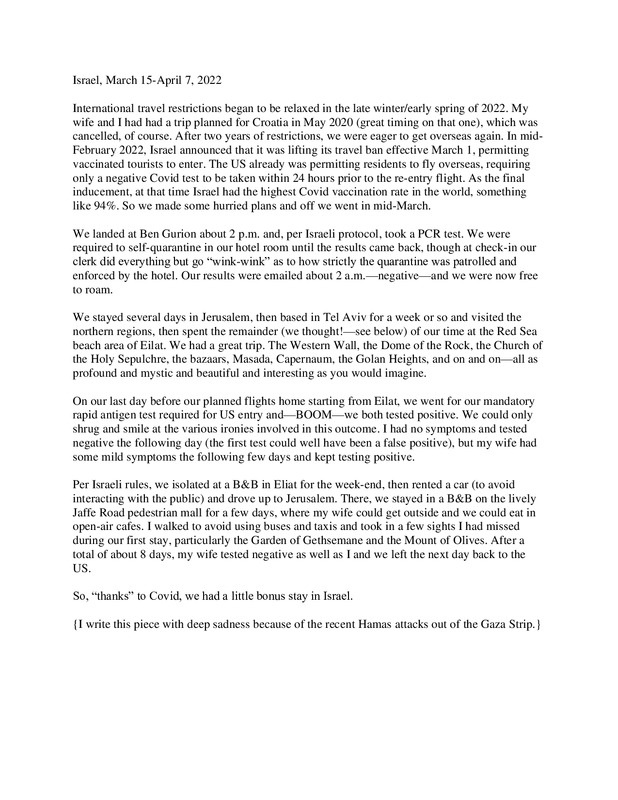 2022-05-14
2022-05-14Dealing with COVID in Israel two weeks after the lifting of the travel ban
This story relates the issues my wife and I had in dealing with Covid restrictions on a trip to Israel, just two weeks after the travel ban had been lifted. The story has no great significance except, perhaps as an example of "life is irony." While the story itself is trivial and meant to be amusing, I do share it here with a profound sense of sadness over the recent Hamas attacks and their consequences. -
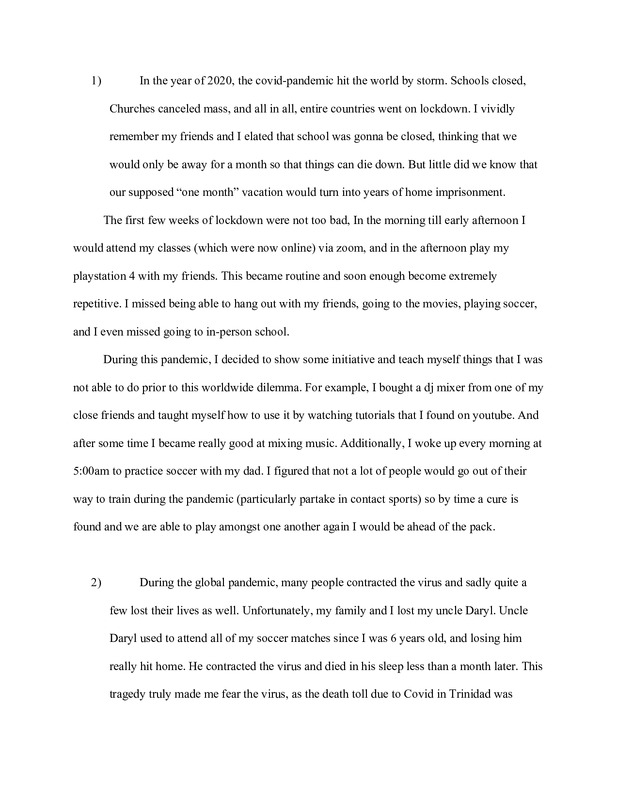 2020
2020Life of a Trini during the Covid 19 Pandemic
My story talks about difficulty I experienced during the pandemic -
2023-07-21
A Year of Betrayal
This doesn't need to be long I am just glad to have a way to express how incredibly disappointed I have been throughout the course of this pandemic. In the first few months after the outbreak, most of us relied heavily on the public governmental briefings by Dr Fauci and others, and we eagerly awaited the development of tests and vaccines by the pharmaceutical industry. We trusted that our government and our doctors were working earnestly to provide good solutions to a terrible problem, quickly. But if we fast forward a few years, what a horrible change has transpired! Pretty much everyone who we trusted at the beginning of the pandemic has been proven either a downright liar or to have been working for their own private interests all along. Dr Fauci couldn't get his story straight - repeatedly - over simple matters, and lied again and again about the connection between the virus, the government, and the Wuhan virology lab. Though various remedies (like ivermectin) were decried as malicious and dangerous, we now know that the pharmaceutical companies we were busy trusting were pushing to consider the use of ivermectin medical malpractice, because they wanted an emergency use authorization for their insufficiently tested and experimental vaccines. Some of us already knew we couldn't trust our government, but most of us hoped that we could at least trust our doctors. What a disappointment. -
2022-02-26
My Personal Experience with COVID-19
It was Christmas of 2020, and my eighty-four-year-old Dad was really sick. Up until then he had been healthy. He worked out at the gym every day and always went for coffee at Starbucks afterwards. I call him every day, and I could tell he was under the weather, but he didn’t want to admit he had COVID-19. He was sick for several weeks but came over on Christmas Eve to have dinner with our family. I remember being slightly irritated that he did come over because we could have brought him dinner at his house and minimized exposure to everyone else. Fortunately, our family and my sister’s family did not catch it that year. Oddly enough, we wouldn’t catch it until the following year. I remember being sort of surprised that we didn’t catch it because everyone around us had it. When the gyms and restaurants and grocery stores all closed, I would walk around our subdivision everyday to continue my exercise routine and I noticed I was tired and had shortness of breath. I remember going in for my annual physical with a face mask on and telling my doctor my symptoms. I remember him saying that those symptoms were too early to be COVID-19 and was probably a milder version of the flu. I was doubtful due to being heavily exposed by my dad, as well as so many others who had no idea they had it but were technically “super-spreaders.” My sister’s family and our family caught Covid within a week or two of each other despite not having any contact and being vaccinated the prior year. My husband and I both opted for the Johnson& Johnson vaccination because it was traditional with just the one shot. Our friend, who worked with my husband also got the same vaccination. My husband and I were sick after the shot, but we knew from friends that we would be. It lasted maybe a night and then we felt better the next day. Our friend wound up in the hospital after her vaccination with a small intestinal blockage which she blamed on the shot. She stayed in the hospital for about a week, but other than some follow-up monitoring, she is ok. Shortly after that, we read in the news that several women had died from embolisms after receiving the vaccination. Our daughter, who has special needs, sees many doctors and I remember telling him that I just gotten vaccinated and now there was this complication. He was very reassuring and said that the women who had passed away probably had a serious and pre-existing condition. He told me to stay active for the next week or two and drink lots of water which I did, but it was the longest two weeks until we were cleared from the risk. We did end up catching Covid in February-March 2022. It had been a normal week. I went to the store, gym, did carpool, walked the greenway, but I felt slightly off all week long. I remember coming home and making dinner, but I was exhausted and told my husband that I was unable to have dinner with everyone that evening. Sure enough, I was running a low fever. I took an at-home COVID test, and my results showed I was positive within a few seconds. I immediately quarantined in our bedroom for the next several days. My husband caught it about a week later, but his symptoms were different than mine. He had a bad sore throat and was cold and shivering for a couple of days, and had a cough that lingered. Our daughter, who has severe Cerebral Palsy, caught it next but thankfully she only had mild symptoms for two days and recovered almost immediately. Our son caught it last, and he had a very bad sore throat for a week. We made it through, and consider ourselves fortunate that we recovered without long-term issues. -
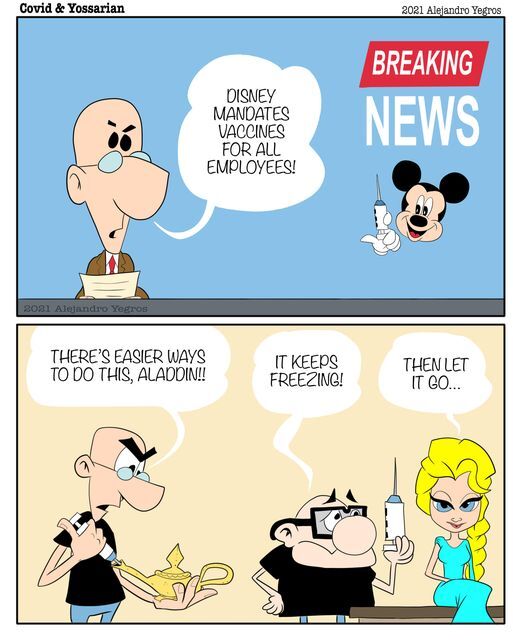 2021-08-02
2021-08-02Disney Mandates
A comic strip about Covid-19 -
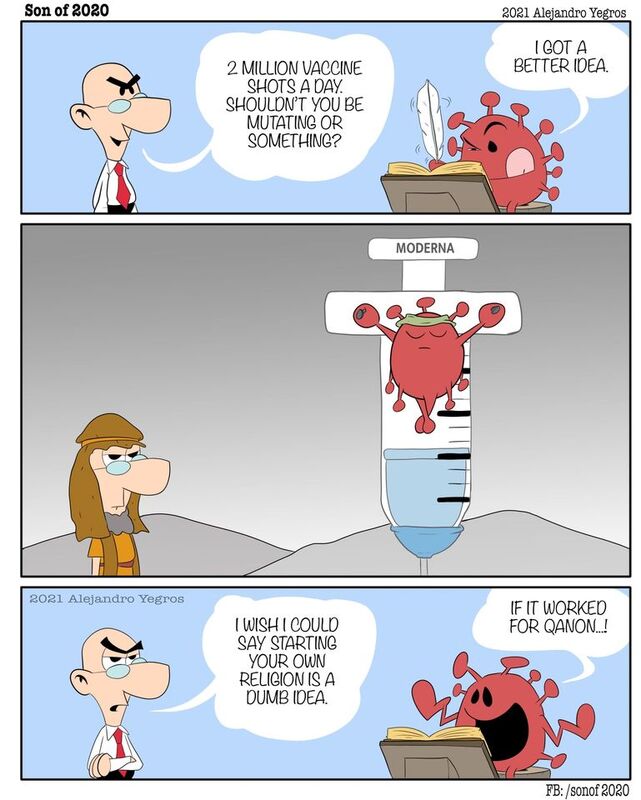 2021-04-02
2021-04-02Religion is the Opiate
A comic strip about Covid-19 -
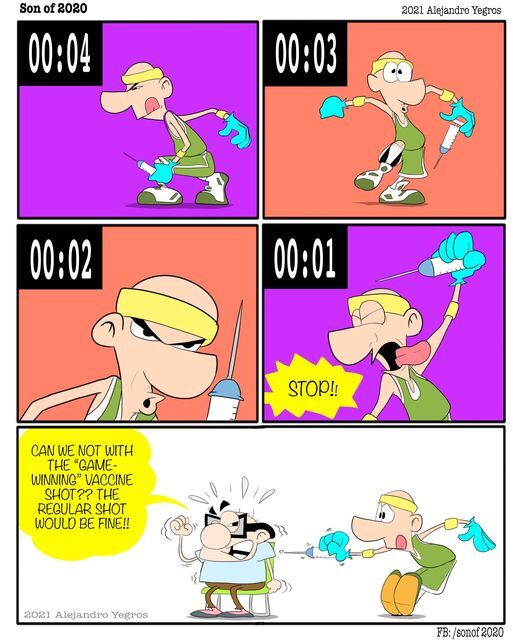 2021-04-23
2021-04-23Basketball Connections
A comic strip about Covid-19 -
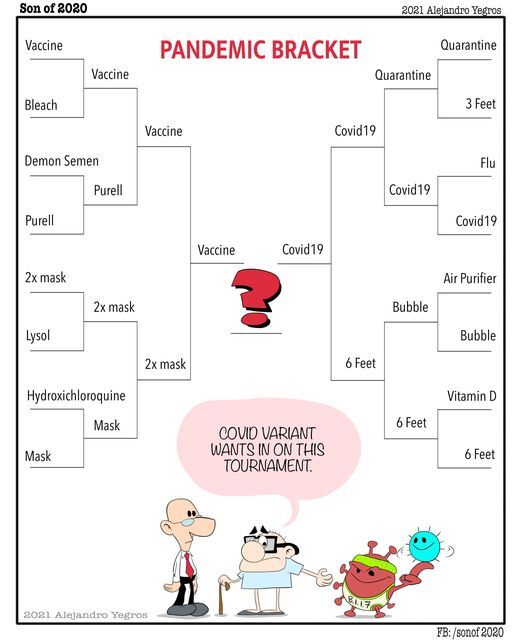 2021-03-22
2021-03-22Pandemic Bracket
A comic strip about Covid-19 -
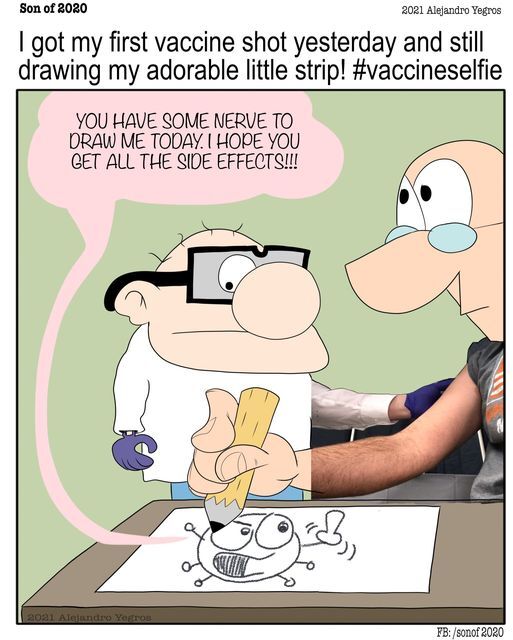 2021-03-18
2021-03-18#vaccineselfie
A comic strip about Covid-19 -
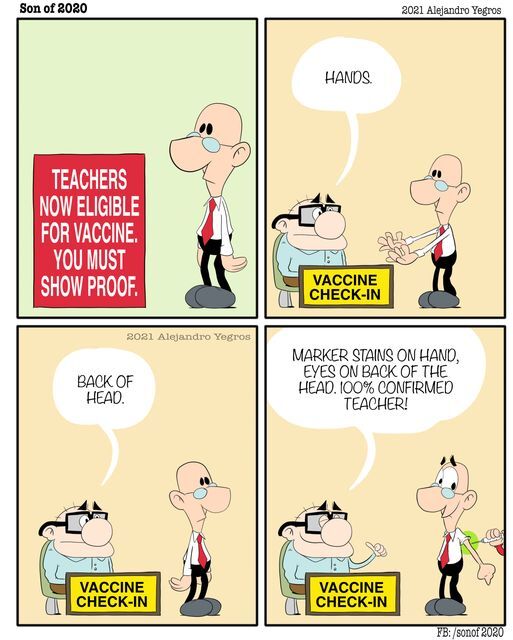 2021-03-04
2021-03-04Teachers Eligible
A comic strip about Covid-19 -
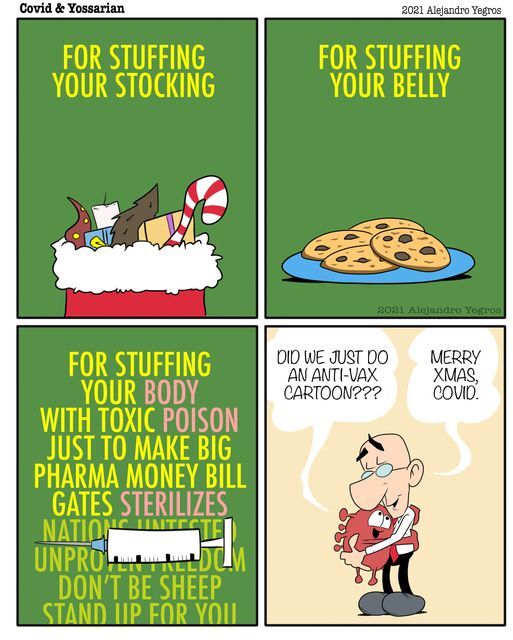 2021-12-24
2021-12-24Xmas Present
A comic strip about Covid-19 -
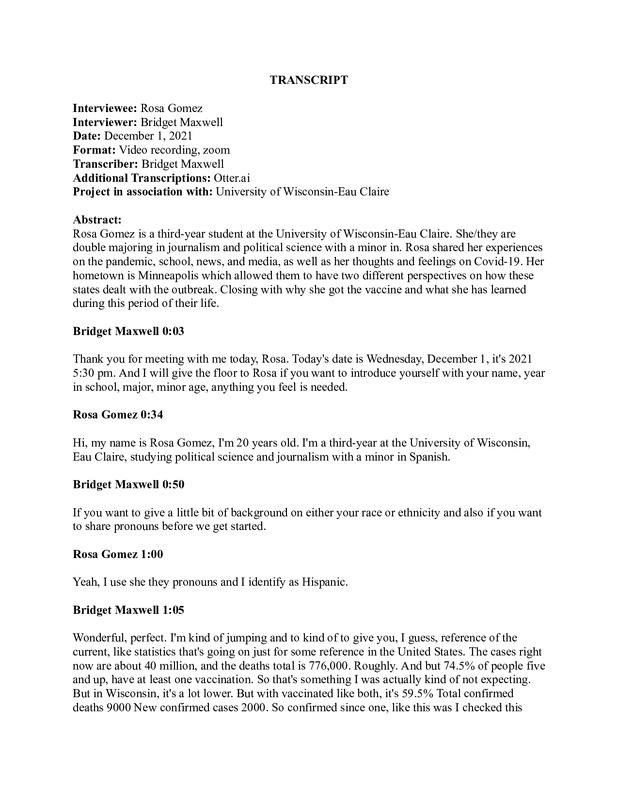 12/01/2021
12/01/2021Rosa Gomez Oral History, 2021/12/01
Rosa Gomez is a third-year student at the University of Wisconsin-Eau Claire. She/they are double majoring in journalism and political science with a minor in. Rosa shared her experiences on the pandemic, school, news, and media, as well as her thoughts and feelings on Covid-19. Her hometown is Minneapolis which allowed them to have two different perspectives on how these states dealt with the outbreak. Closing with why she got the vaccine and what she has learned during this period of their life. -
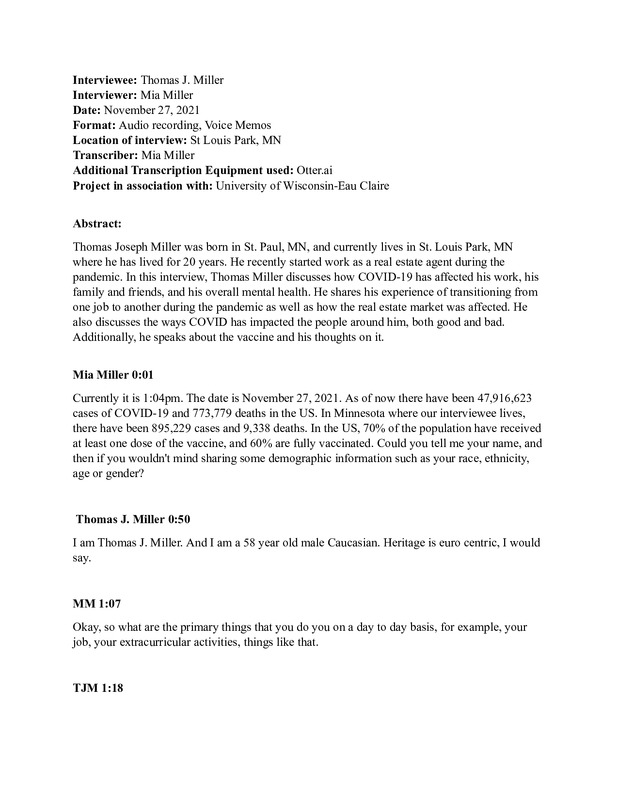 11/27/2021
11/27/2021Thomas J. Miller Oral HIstory, 2021/11/27
Thomas Joseph Miller was born in St. Paul, MN, and currently lives in St. Louis Park, MN where he has lived for 20 years. He recently started work as a real estate agent during the pandemic. In this interview, Thomas Miller discusses how COVID-19 has affected his work, his family and friends, and his overall mental health. He shares his experience of transitioning from one job to another during the pandemic as well as how the real estate market was affected. He also discusses the ways COVID has impacted the people around him, both good and bad. Additionally, he speaks about the vaccine and his thoughts on it. -
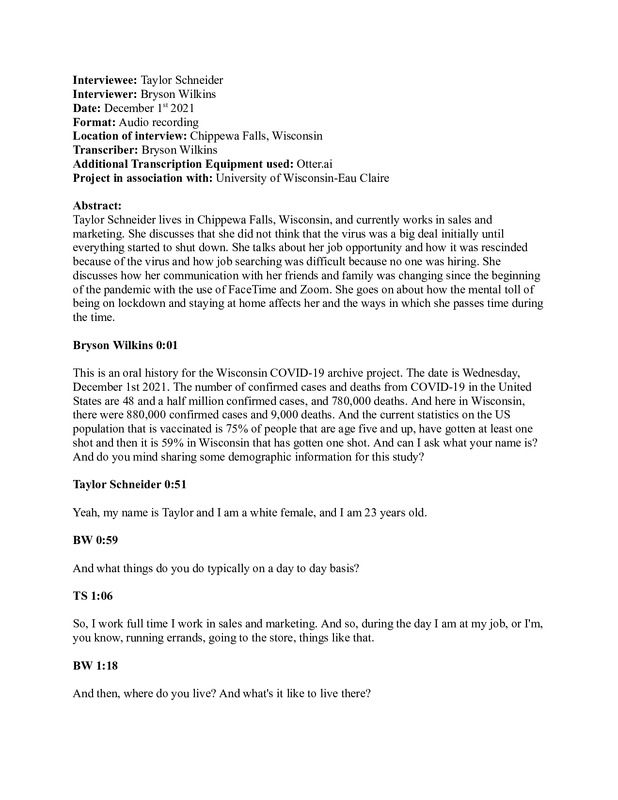 12/01/2021
12/01/2021Taylor Schneider Oral History, 2021/12/01
Taylor Schneider lives in Chippewa Falls, Wisconsin, and currently works in sales and marketing. She discusses that she did not think that the virus was a big deal initially until everything started to shut down. She talks about her job opportunity and how it was rescinded because of the virus and how job searching was difficult because no one was hiring. She discusses how her communication with her friends and family was changing since the beginning of the pandemic with the use of FaceTime and Zoom. She goes on about how the mental toll of being on lockdown and staying at home affects her and the ways in which she passes time during the time. -
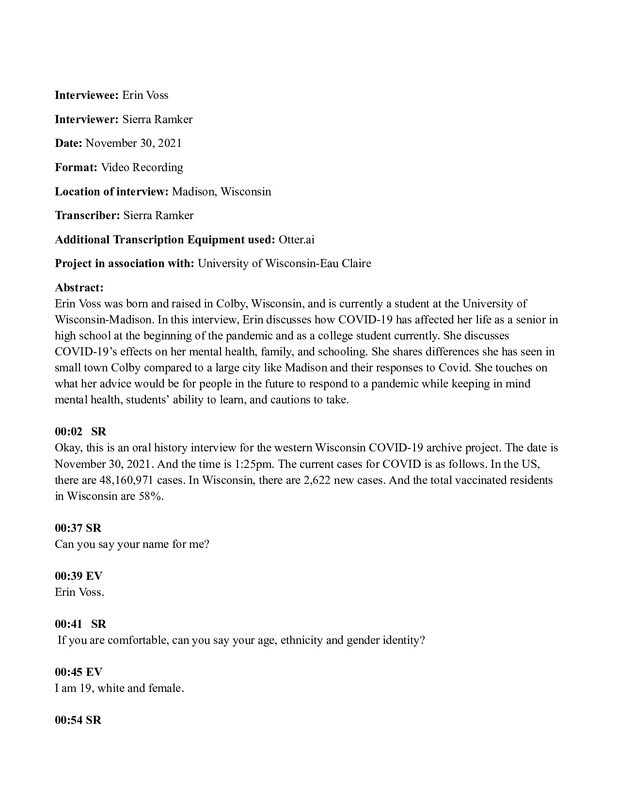 11/30/2021
11/30/2021Erin Voss Oral History, 2021/11/30
Erin Voss was born and raised in Colby, Wisconsin, and is currently a student at the University of Wisconsin-Madison. In this interview, Erin discusses how COVID-19 has affected her life as a senior in high school at the beginning of the pandemic and as a college student currently. She discusses COVID-19’s effects on her mental health, family, and schooling. She shares differences she has seen in small town Colby compared to a large city like Madison and their responses to Covid. She touches on what her advice would be for people in the future to respond to a pandemic while keeping in mind mental health, students’ ability to learn, and cautions to take. -
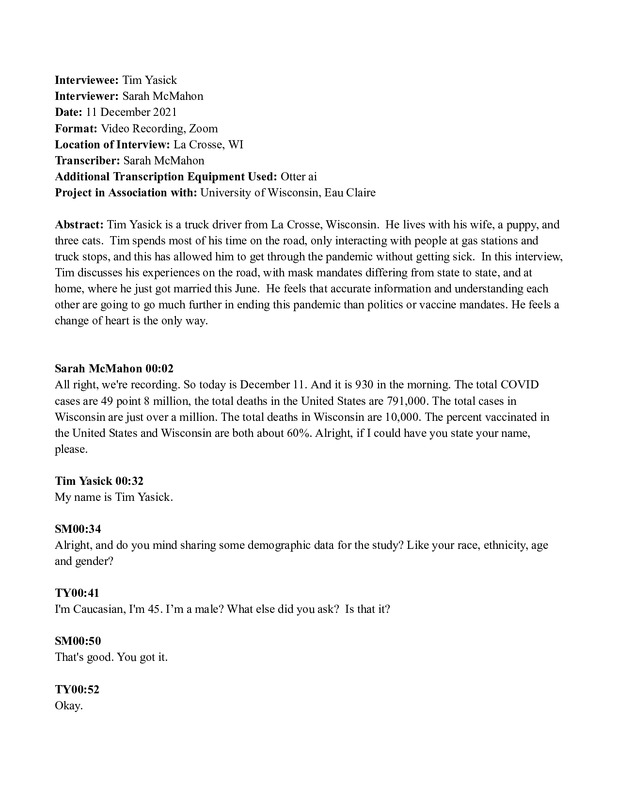 12/11/2021
12/11/2021Tim Yasick Oral History, 2021/12/11
Tim Yasick is a truck driver from La Crosse, Wisconsin. He lives with his wife, a puppy, and three cats. Tim spends most of his time on the road, only interacting with people at gas stations and truck stops, and this has allowed him to get through the pandemic without getting sick. In this interview, Tim discusses his experiences on the road, with mask mandates differing from state to state, and at home, where he just got married this June. He feels that accurate information and understanding each other are going to go much further in ending this pandemic than politics or vaccine mandates. He feels a change of heart is the only way. -
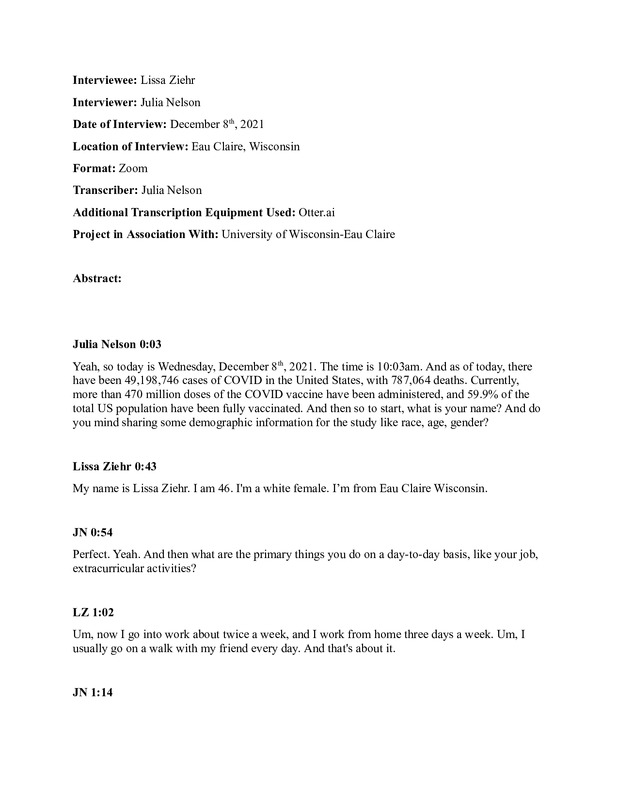 12/08/2021
12/08/2021Lissa Ziehr Oral History, 2021/12/08
-
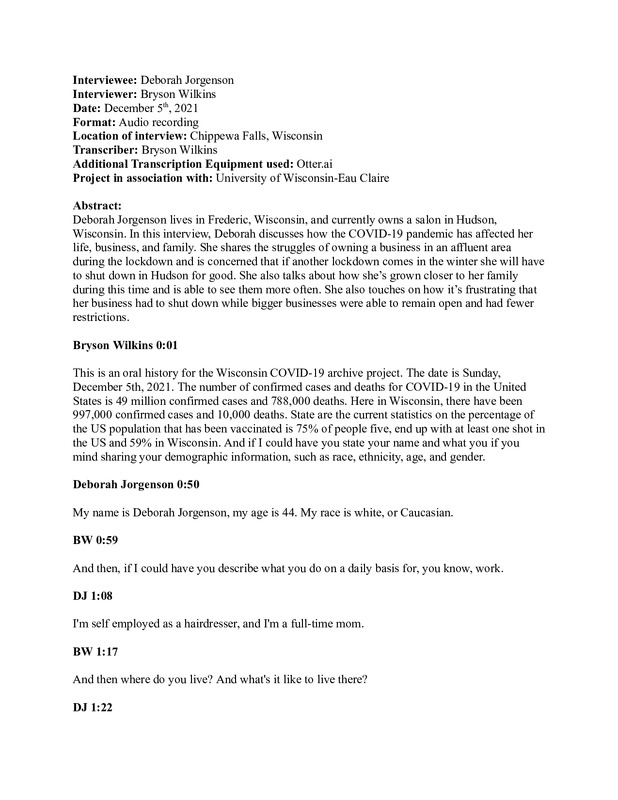 12/05/2021
12/05/2021Deborah Jorgenson Oral History, 2021/12/05
Deborah Jorgenson lives in Frederic, Wisconsin, and currently owns a salon in Hudson, Wisconsin. In this interview, Deborah discusses how the COVID-19 pandemic has affected her life, business, and family. She shares the struggles of owning a business in an affluent area during the lockdown and is concerned that if another lockdown comes in the winter she will have to shut down in Hudson for good. She also talks about how she’s grown closer to her family during this time and is able to see them more often. She also touches on how it’s frustrating that her business had to shut down while bigger businesses were able to remain open and had fewer restrictions. -
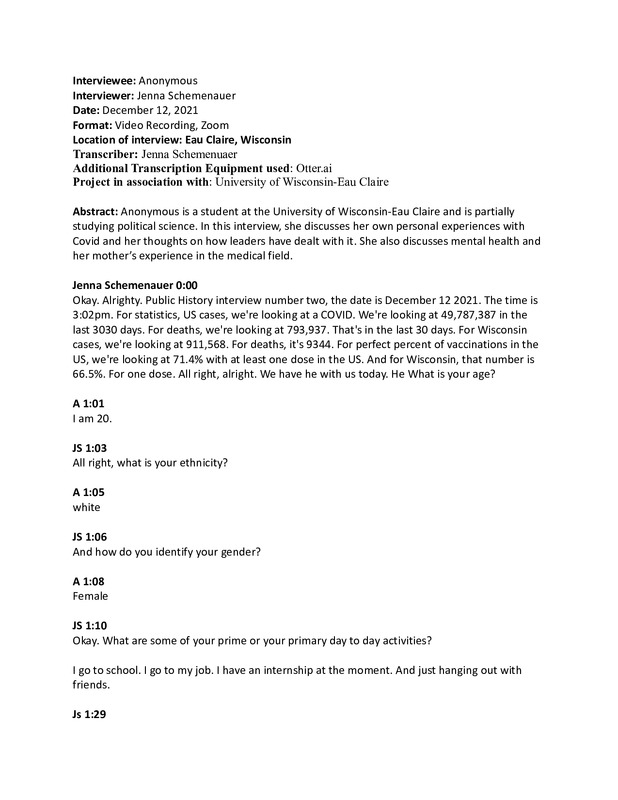 12/12/2021
12/12/2021Anonymous Oral History, 2021/12/12
Anonymous is a student at the University of Wisconsin-Eau Claire and is partially studying political science. In this interview, she discusses her own personal experiences with Covid and her thoughts on how leaders have dealt with it. She also discusses mental health and her mother’s experience in the medical field. -
2021-06-06
My Reverse Homecoming
The first trip my wife and I took after the COVID travel restrictions were lifted was a doozy. Our first flight in over a year was a three-hop journey from our small Montana town to Alaska for an old friend’s wedding. With a six-month-old. On our laps. The whole time. My wife and I had our first round of vaccines but worried about our daughter, who was still far too young to have a dose. After much risk assessment and consultation with our pediatrician, we decided to go for it. Mask wear was strictly enforced on the airplane and in most of the public places we found ourselves, and there was a profound and somewhat discomforting sense that we and our fellow travelers were searching for a way to exist comfortably in this new not-yet-maybe-never-post-COVID world. The thing I remember most, though, was how incredibly freeing it felt to be somewhere new again. So much time spent at home, however necessary, had inflicted an unhealthy solitude on much of society, and my first time solidly stepping away from that felt energizing. I’ve always loved to travel and doing so after the darkest days of the pandemic felt like a happy return to form. A reverse homecoming, if you will. -
2022-11-21
Why?
At the beginning of the Covid-19 Pandemic, my dad was (and still is) a skeptic. He would always ask, "Why do some people get Covid, and others don't? How does the virus choose it's victims?" As the Pandemic continued to grow and spread, my step-mother and I got Covid at the same time. My dad took care of both of us, yet he still did not get Covid. We all survived. Then, the vaccine shots came out, and my dad said, "Hey, I never got it. Why should I take something, when I never got it in the first place?" He did not get the vaccine, while the rest of the family did. Then, my step-mother and I got Covid for a second time. We survived again. Dad said, "I never got the vaccine, and I never got Covid. You guys get the vaccine, and you have it twice. I don't understand at all." To this day, Dad still has not gotten Covid and still refuses to get the vaccines. -
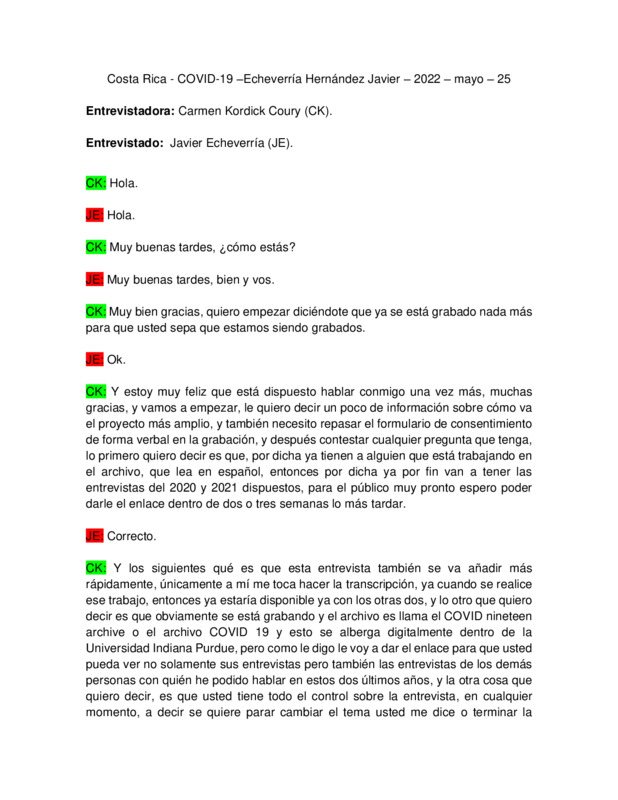 05/25/2022
05/25/2022Javier Echeverria Hernández Oral History, 2022/05/25
En esta entrevista Javier Hernández Echeverria es entrevistado por Carmen Kordick Coury concerniente al covid-19 en Costa Rica. Para empezar, hablan de los cambios que habían pasado desde el año anterior. Hablan de la situación en cuenta la pandemia y el programa de la vacunación. Hablan de la gente que aun no se han vacunado por falta de querer. Habla del camino a la normalidad, el uso de mascarillas, del gobierno, y nuevos candidatos. De allí hablan de su vida social, y el concierto de Cold Play. De La Caja, las elecciones, y el seguro social. Otra ves vuelven al tema de las vacunas, de gente que no se quiere vacunarse, de la familia de Javier y las noticias falsas. Habla sobre su vida ya jubilado, de la economía y inflación y gente sin trabajo. Para terminar, hablan de fuentes de información, de las elecciones y el nuevo gobierno. Al final habla del futuro. -
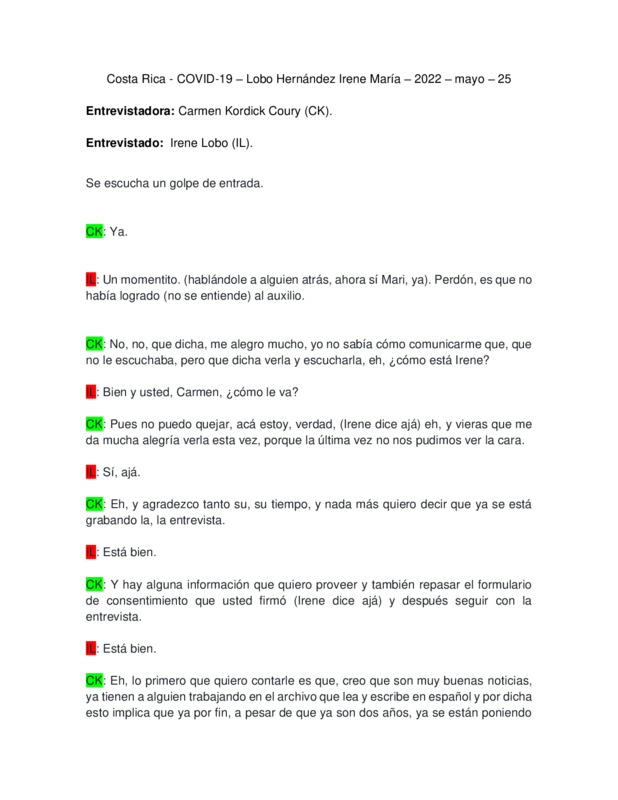 05/25/2022
05/25/2022Irene Lobo Hernández Oral History, 2022/05/25
En esta entrevista Irene Lobo Hernández es entrevistada por Carmen Kordick Coury concerniente al covid-19 en Costa Rica. Para empezar, hablan de lo que ha cambiado desde el ano anterior. Habla de su trabajo de abogada, del desempleo y la economía. Irene también habla del gobierno, de las vacunas y de gente que no confía en las vacunas. Habla de las elecciones y los candidatos. De gente conocida que se han enfermaron y unos que han fallecido por la pandemia. Irene también habla de las formas de celebrar la vida de su hermana que falleció el año anterior, habla de su familia y el uso de las mascarillas. Para terminar, habla de sus fuentes principales de información, la información falsa y sus deseos para el futuro. -
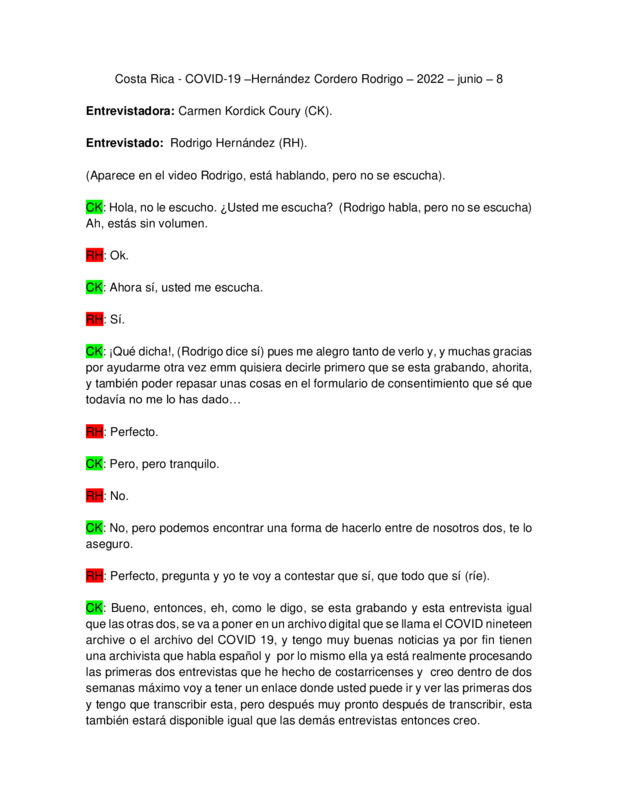 06/08/2022
06/08/2022Rodrigo Hernández Cordero Oral History, 2022/06/08
En esta entrevista Rodrigo Hernández Cordero es entrevistada por Carmen Kordick Coury concerniente al covid-19 en Costa Rica. Para empezar, hablaron de cosas que han cambiado desde el ano anterior. Hablaron de su negocio, inflación, y el gobierno. De allí hablaron del gobierno, la vacuna, y la mascarilla. Hablaron de La Caja, su vida social, y su familia. De las elecciones, fuentes principales de noticias y estudios cerebrales. Para terminar, hablaron de la juventud y de sus pensamientos del futuro. -
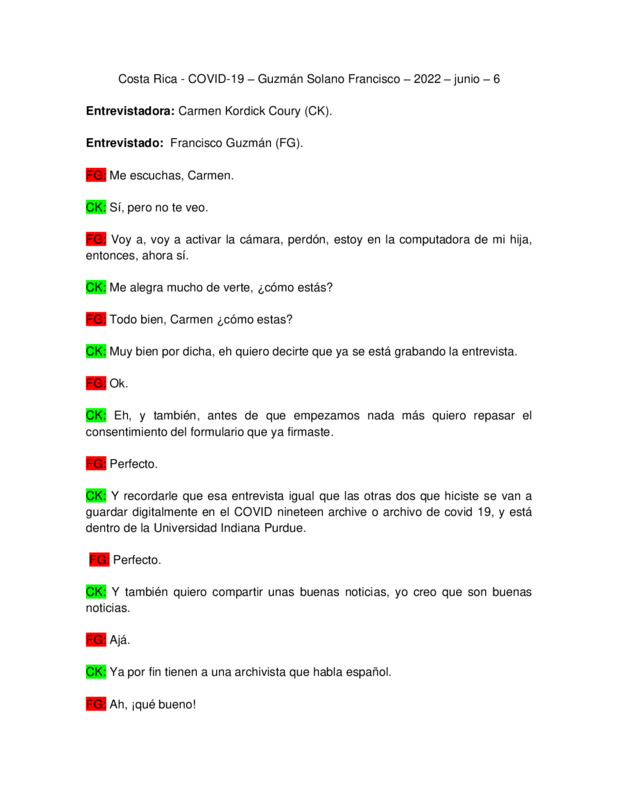 06/06/2022
06/06/2022Francisco Guzman Solano Oral History, 2022/06/06
En esta entrevista Francisco Guzman Solano es entrevistada por Carmen Kordick Coury concerniente al covid-19 en Costa Rica. Empiezan con los cambios que había pasado desde el ano anterior. Francisco habla de su familia y vida social. Hablan del uso de las máscaras, vacunas y la información falsa. De allí, hablan de la economía y la inflación, del gobierno y las elecciones. Hablan del crimen y las drogas. Para terminar, hablan de las fuentes principales de noticias y el futuro. -
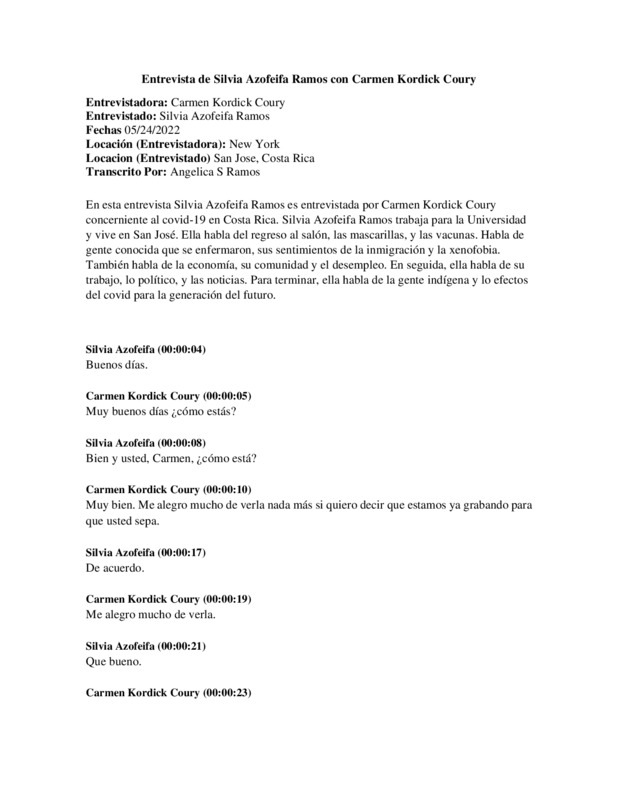 05/24/2022
05/24/2022Silvia Azofeifa Ramos Oral History, 2022/05/24
En esta entrevista Silvia Azofeifa Ramos es entrevistada por Carmen Kordick Coury concerniente al covid-19 en Costa Rica. Silvia Azofeifa Ramos trabaja para la Universidad y vive en San José. Ella habla del regreso al salón, las mascarillas, y las vacunas. Habla de gente conocida que se enfermaron, sus sentimientos de la inmigración y la xenofobia. También habla de la economía, su comunidad y el desempleo. En seguida, ella habla de su trabajo, lo político, y las noticias. Para terminar, ella habla de la gente indígena y lo efectos del covid para la generación del futuro. -
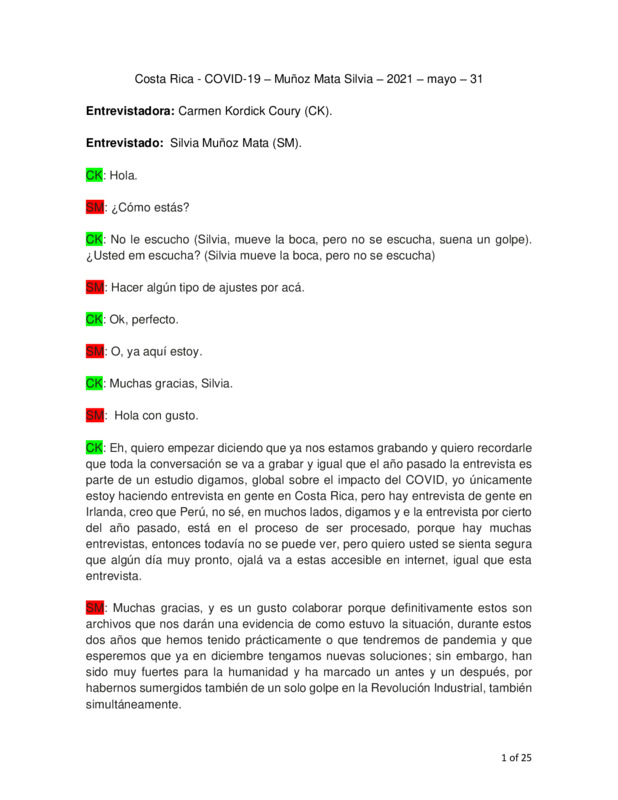 05/31/2021
05/31/2021Silvia Muñoz Mata Oral History, 2021/05/31
En esta entrevista Silvia Muñoz Mata es entrevistada por Carmen Kordick Coury concerniente al covid-19 en Costa Rica. Empiezan hablando de los cambios que habían ocurrido desde el ano anterior. Hablan del trabajo y el trabajo virtual. De la violencia domestica y otros problemas que existen en la sociedad. De allí hablan del crimen, violencia y las divisiones económicas que existen alrededor de ella. Hablan de las vacunas, gente conocida que no se quiere vacunarse y las teorías conspiratorias que existen sobre las vacunas. De allí hablan del gobierno, familia y salud física y mental. Para terminar hablan de narcotraficantes y del futuro. -
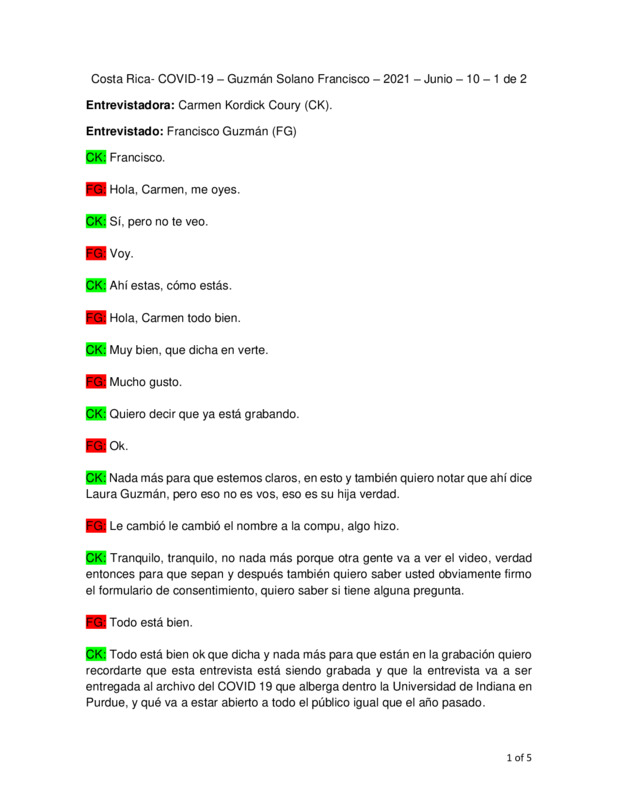 06/10/2021
06/10/2021Francisco Guzman Solano Oral History, 2021/06/21
En esta entrevista Francisco Guzman Solano es entrevistado por Carmen Kordick Coury concerniente al covid-19 en Costa Rica. Empiezan hablar de los cambios que Francisco ha visto desde el ano anterior. Hablan de la economía y el gobierno, de su trabajo y la vacuna. También hablan del aumento del crimen, de las drogas, y de las noticias falsas. De la Caja y el ministro de Salud. Francisco también habla de su familia y su hogar, de las fuentes principales de información y la sociedad. Terminan hablando de las clases virtuales de su hija, de la educación y del Ministerio de Educación. -
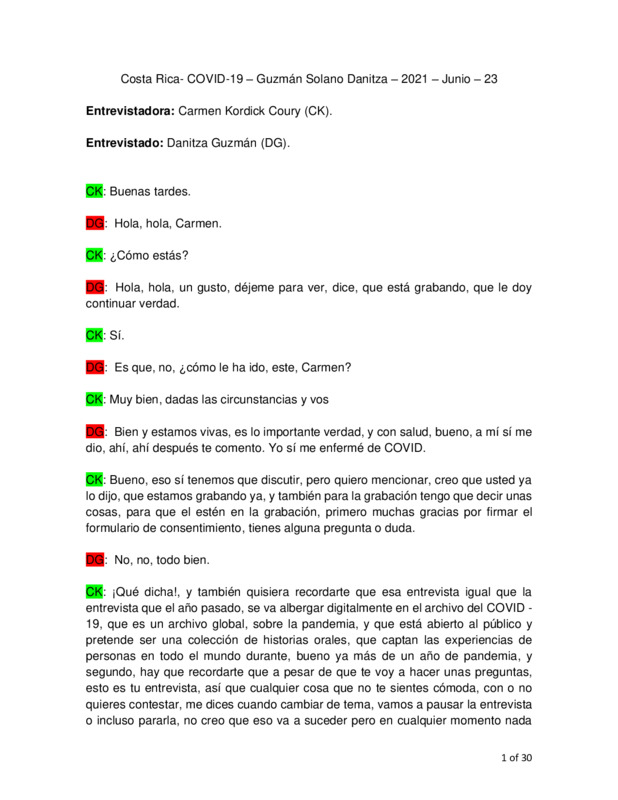 06/23/2021
06/23/2021Danitza Guzman Solano Oral History, 2021/06/23
En esta entrevista Danitza Guzman Solano es entrevistada por Carmen Kordick Coury concerniente al covid-19 en Costa Rica. Hablan de los cambios que han ocurrido desde el ano anterior. De su trabajo como docente, los cambios que han ocurrido y sus estudiantes. Hablan del ministerio de educación, ministerio de salud y de las vacunas. También hablan de gente que no se quieren vacunar y cuenta de cuando se enfermo con el coronavirus. Danitza habla de gente conocida que se enfermaron y algunos que murieron de la enfermedad. Para terminar, hablan del gobierno, del futuro, de la salud mental y de las elecciones. -
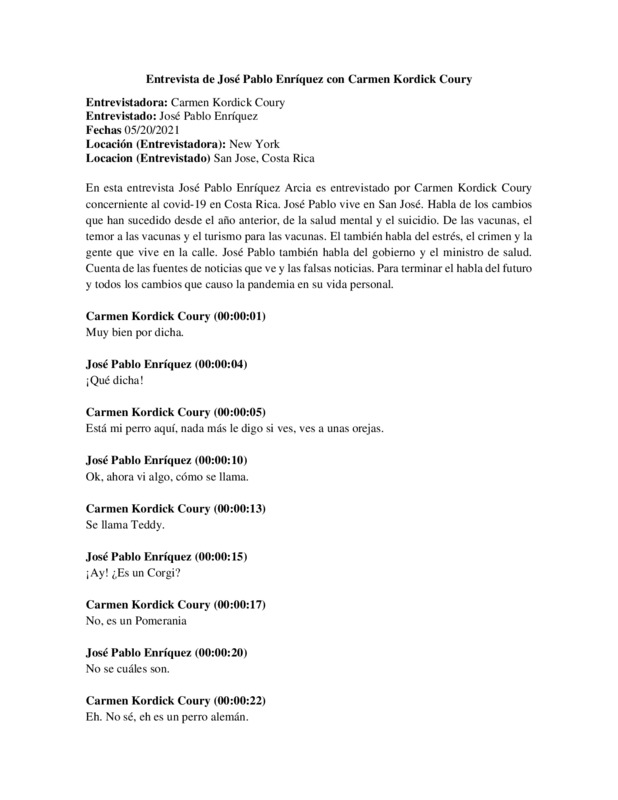 05/20/2021
05/20/2021José Pablo Enriquez Arcia Oral History, 2021/05/20
En esta entrevista José Pablo Enríquez Arcia es entrevistado por Carmen Kordick Coury concerniente al covid-19 en Costa Rica. José Pablo vive en San José. Habla de los cambios que han sucedido desde el año anterior, de la salud mental y el suicidio. De las vacunas, el temor a las vacunas y el turismo para las vacunas. El también habla del estrés, el crimen y la gente que vive en la calle. José Pablo también habla del gobierno y el ministro de salud. Cuenta de las fuentes de noticias que ve y las falsas noticias. Para terminar el habla del futuro y todos los cambios que causo la pandemia en su vida personal. -
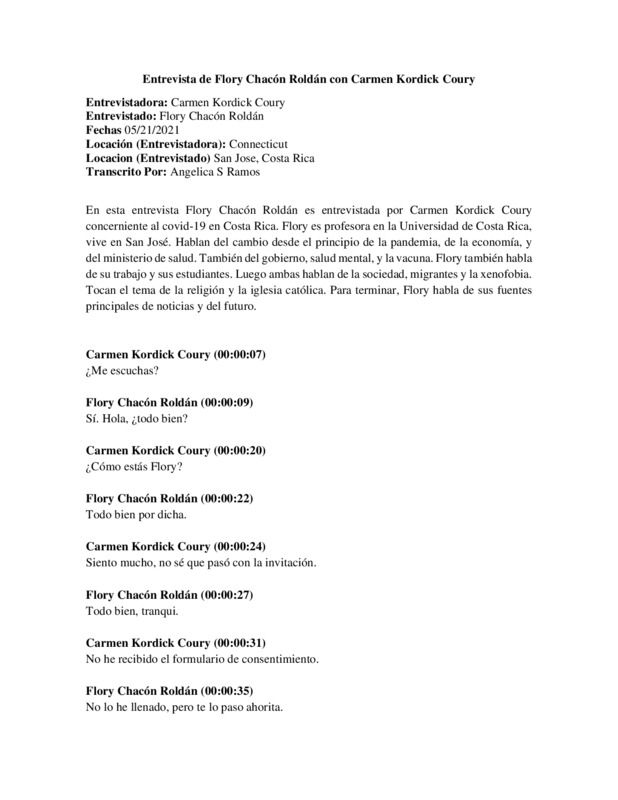 05/21/2021
05/21/2021Flory Chacón Roldán Oral History, 2021/05/21
En esta entrevista Flory Chacón Roldán es entrevistada por Carmen Kordick Coury concerniente al covid-19 en Costa Rica. Flory es profesora en la Universidad de Costa Rica, vive en San José. Hablan del cambio desde el principio de la pandemia, de la economía, y del ministerio de salud. También del gobierno, salud mental, y la vacuna. Flory también habla de su trabajo y sus estudiantes. Luego ambas hablan de la sociedad, migrantes y la xenofobia. Tocan el tema de la religión y la iglesia católica. Para terminar, Flory habla de sus fuentes principales de noticias y del futuro. -
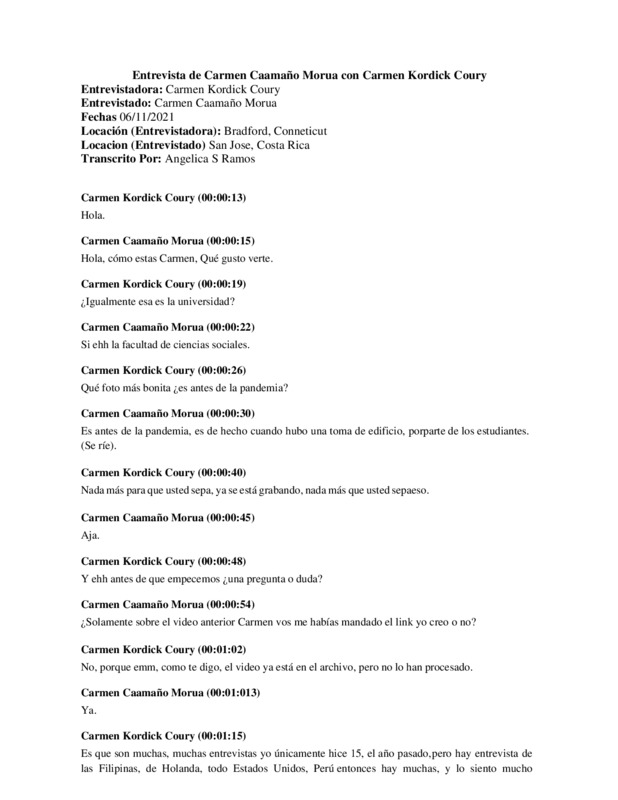 06/11/2021
06/11/2021Carmen Caamaño Morua Oral History, 2021/06/11
En esta entrevista Carmen Caamaño Morua es entrevistado por Carmen Kordick Coury concerniente al covid-19 en Costa Rica. Carmen es profesora en la Universidad de Costa Rica y vive en San José. Habla de su trabajo virtual en la universidad, del crisis de la salud mental y de la gente que cree en las teorías de la conspiración. Carmen habla de la relación entra las ciencias y la religión y como eso afecta los sentimientos hacia la vacuna. Habla de la xenofobia, el racismo y el clasismo. También habla de las vacunas y la respuesta del gobierno. Para terminar, Carmen habla del gobierno, la economía y las noticias. -
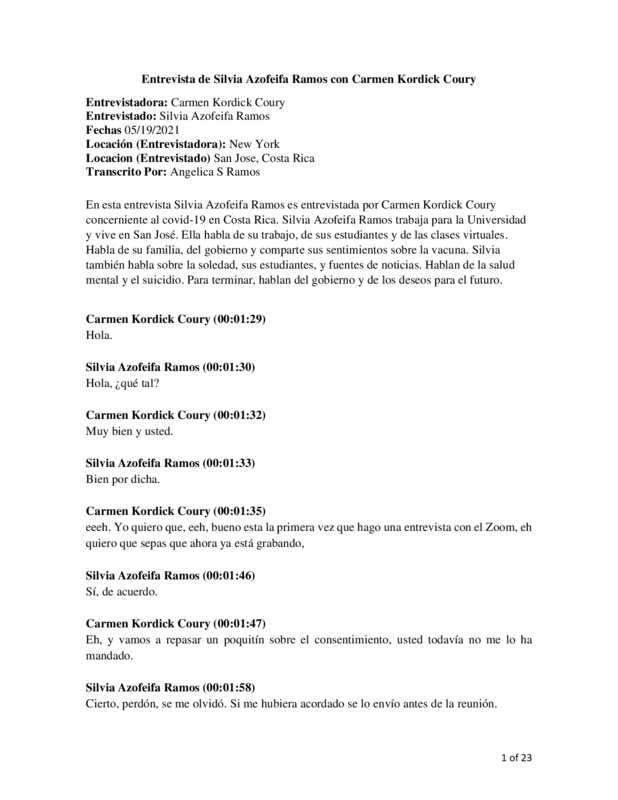 05/19/2021
05/19/2021Silvia Azofeifa Ramos Oral History, 2021/05/19
En esta entrevista Silvia Azofeifa Ramos es entrevistada por Carmen Kordick Coury concerniente al covid-19 en Costa Rica. Silvia Azofeifa Ramos trabaja para la Universidad y vive en San José. Ella habla de su trabajo, de sus estudiantes y de las clases virtuales. Habla de su familia, del gobierno y comparte sus sentimientos sobre la vacuna. Silvia también habla sobre la soledad, sus estudiantes, y fuentes de noticias. Hablan de la salud mental y el suicidio. Para terminar, hablan del gobierno y de los deseos para el futuro. -
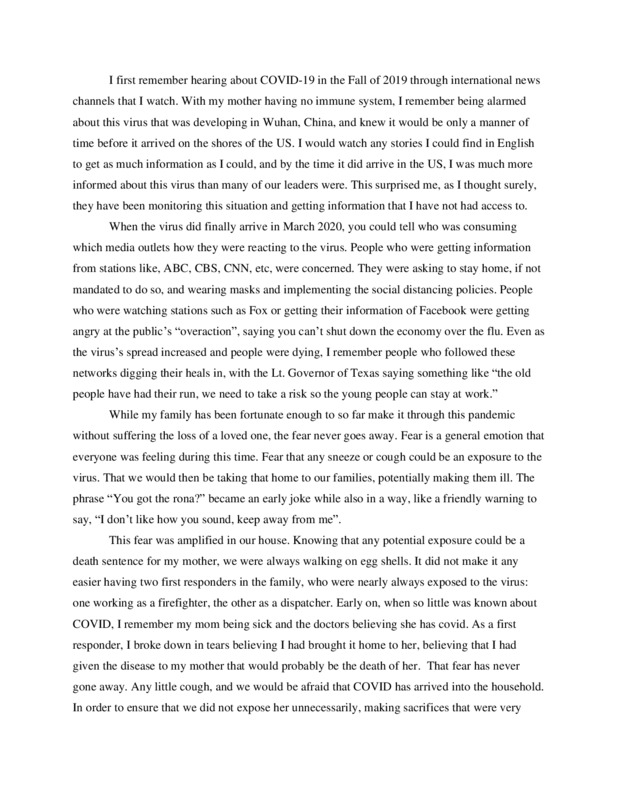 2022-07-24
2022-07-24Fear for My Mother's Saefty
I've written a short story centered around my experience with fear of this virus, particularly focusing on how my fear is heighten with an immuno-compromised mother. I wrote about how the media the people around me consumed affected their behavior and played a role within my fear and the impact it had on my mother. This story says two things about this pandemic I think: it shows the impact that information had/has on how people approach the virus and the emotional toll the pandemic had on people living their daily lives. What I've submitted is important because it validates what Americans have experienced. Many Americans -
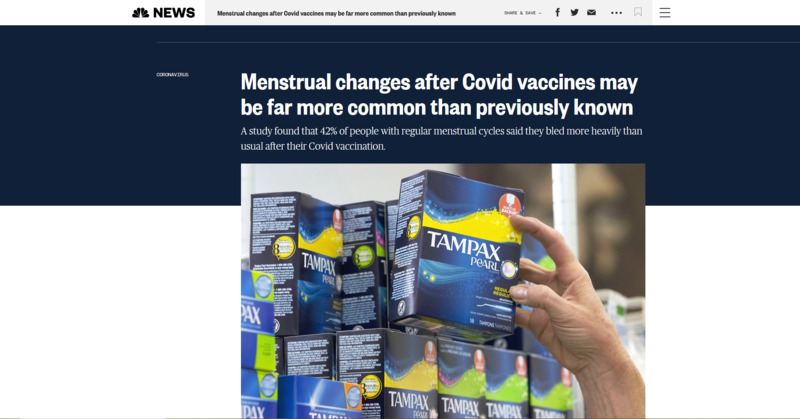 2022-07-15
2022-07-15Menstrual changes after Covid vaccines may be far more common than previously known
This is a news story from NBC News by Sarah Sloat. Since vaccines have been administered for the last year, new information has come out on how they effect the human body. The journal, Science Advances, found 42% of women with regular menstrual cycles bled more heavily after vaccination. 44% said no change occurred, while 14% reported lighter periods. There is no mention on if this side effect has any effect on fertility. -
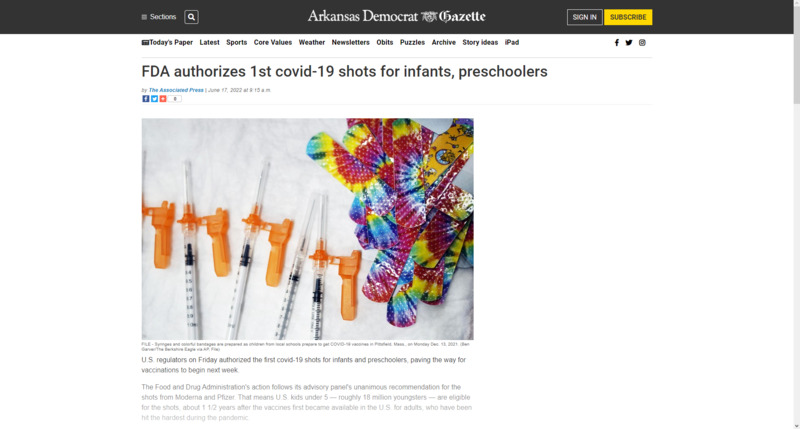 2022-06-17
2022-06-17Shots for the Youth
This article details the FDA's approval for vaccinations of children and infants. With encouragement from the Biden Administration, the youth are the final group with full approval for vaccinations against COVID-19. While this is a good thing for many who take the pandemic seriously, many Arkansans and southerners in general will likely be resistant to this new approval. The south has largely been skeptical of the vaccine and of COVID, and indeed the vaccinating of children with be a harsh topic across the south. It will be interesting to see the backlash and discussion from this decision, as well as analyzing the many questions that will doubtlessly be raised about the powers of the parents. -
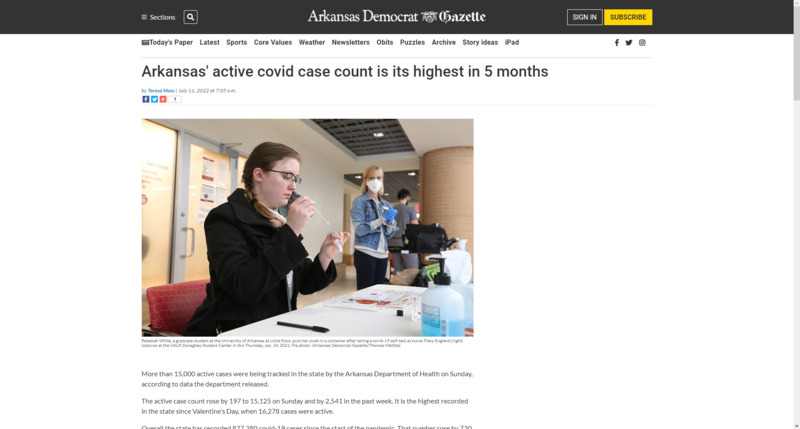 2022-07-11
2022-07-11COVID Cases Once Again On the Rise in Arkansas
This article details a recent surge in Arkansas COVID cases. The shocking nature of the rise is the fact that the state's active cases jumped from 197 to 15,125 in a single day. I think this primarily demonstrates the state and the world's rush to reopen, particularly keeping in mind the July 4th holiday, have allowed a sense of deep comfort. However, this comfort can be deadly when individuals who are feeling unwell fail to take precautions to assure the health and safety of themselves and others. While it is encouraging to see life return to a sense of normalcy, this shows that the pandemic is still a present part of our lives. -
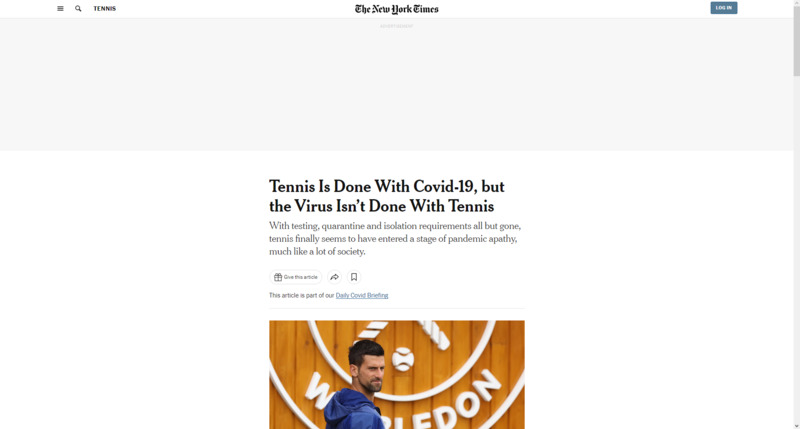 2022-07-10
2022-07-10Tennis Is Done With Covid-19, but the Virus Isn’t Done With Tennis
This is a news story from The New York Times by Matthew Futterman. This story chronicles the changes tennis has gone through during the pandemic. Compared to other professional sports, tennis has been one of the sports with restrictions applied the longest Novak Djokovic, one of the top tennis players in the world, is noted for his refusal of the COVID vaccine. This caused controversy in 2021 at the Australia Open, where his refusal to get vaccinated resulted in his deportation. The Australian government was worried that his refusal would embolden others. The rest of the article goes on about what other tennis players have said about the restrictions, and what they mean for the sport. Some of the tennis players expressed not paying attention to restrictions as much as they used to, and wanting to live like they used to. -
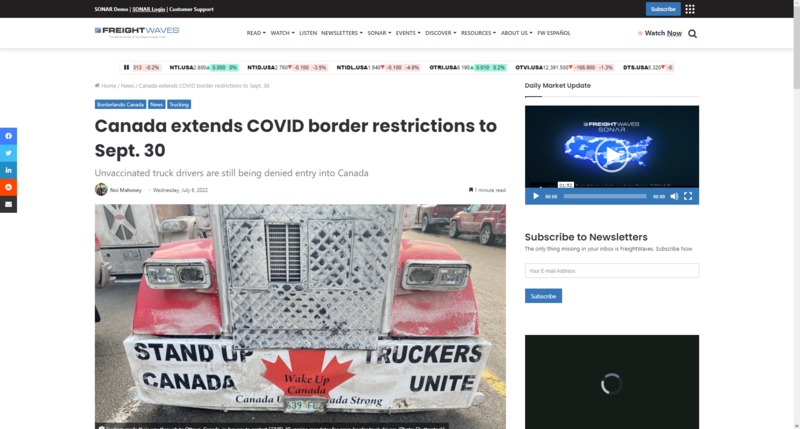 2022-07-06
2022-07-06Canada extends COVID border restrictions to Sept. 30
This is a news story from Freight Waves by Noi Mahoney. Canada's vaccine mandate for border-crossing truck drivers will remain in place until September 30. Americans crossing the Canadian border must be fully vaccinated and are subject to random testing. About 30,000 trucks cross the Canadian border each day. -
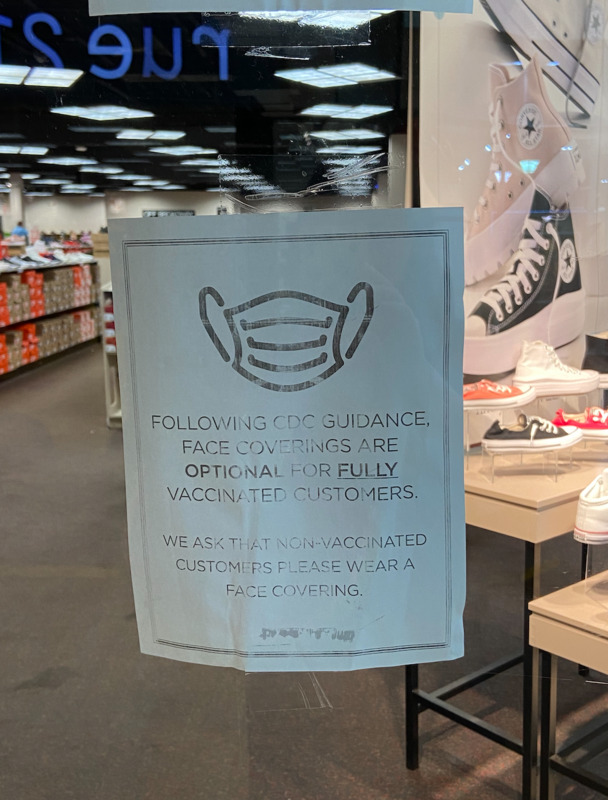 2022-07-05
2022-07-05Masks optional for fully-vaccinated customers
This is a sign I found outside a shoe store at Arizona Mills Mall. It says that masks are optional for fully-vaccinated customers. I didn't go in the store, so I don't know if they would check for vaccination status or not. From my experience with other places with similar signs, no employee has asked about my vaccination status before shopping. I could see this being enforced a year ago, but not now. -
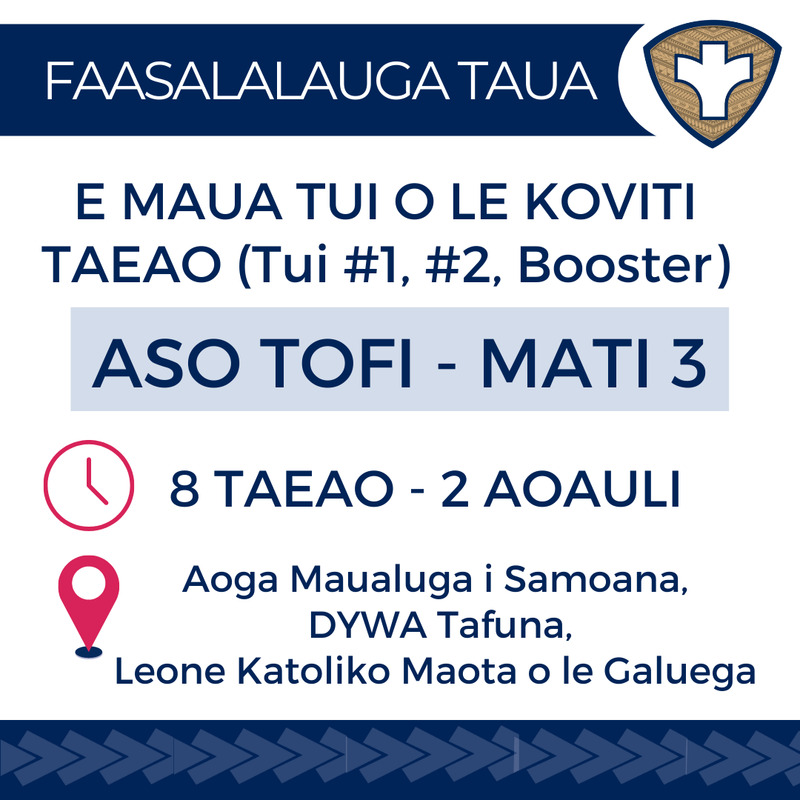 2022-03
2022-03COVID Vaccine Drive Thru Flyers
These are some of the many flyers by the American Samoa Department of Health for the people of American Samoa on information about the where, when, how, what, and why of COVID 19 vaccinations and tests on the island. -
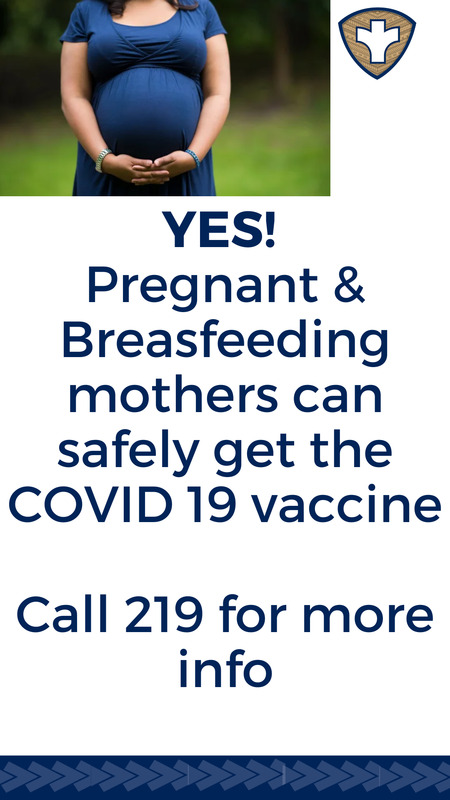 2022-04
2022-04Pregnant Mothers Can Get Safely Vaccinated
The American Samoa Department of Health released this flyer for pregnant women that can get vaccinated safely. This is a piece of great information for the public, especially for pregnant women who are wondering if they can get the vaccine. -
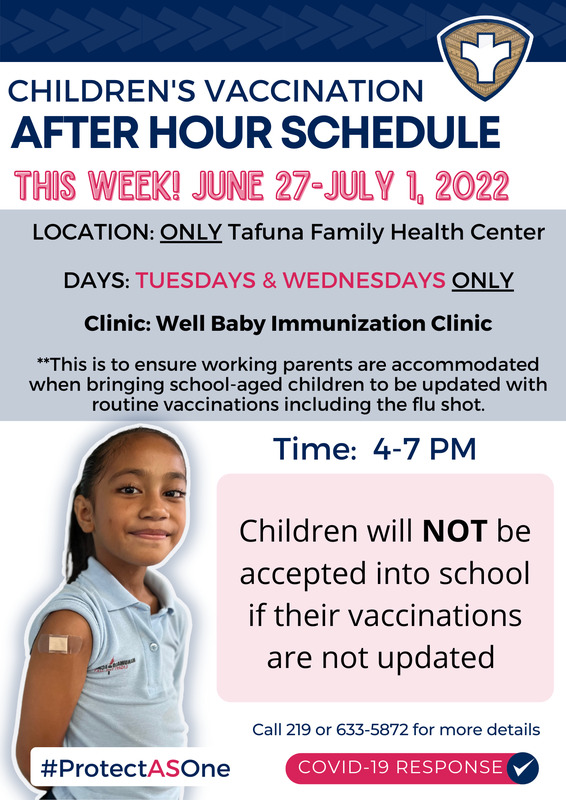 2022-06-27
2022-06-27American Samoa's Children Vaccination
With schools opening back up in American Samoa, children are required to get vaccinated. As the Department of Health points out that children will not be accepted into school if their vaccinations are not updated. The Department of Health has put out this flyer on June 26, 2012, for the public especially working parents to get their children's vaccination after hours from 4-7 pm on June 27 - July 1. -
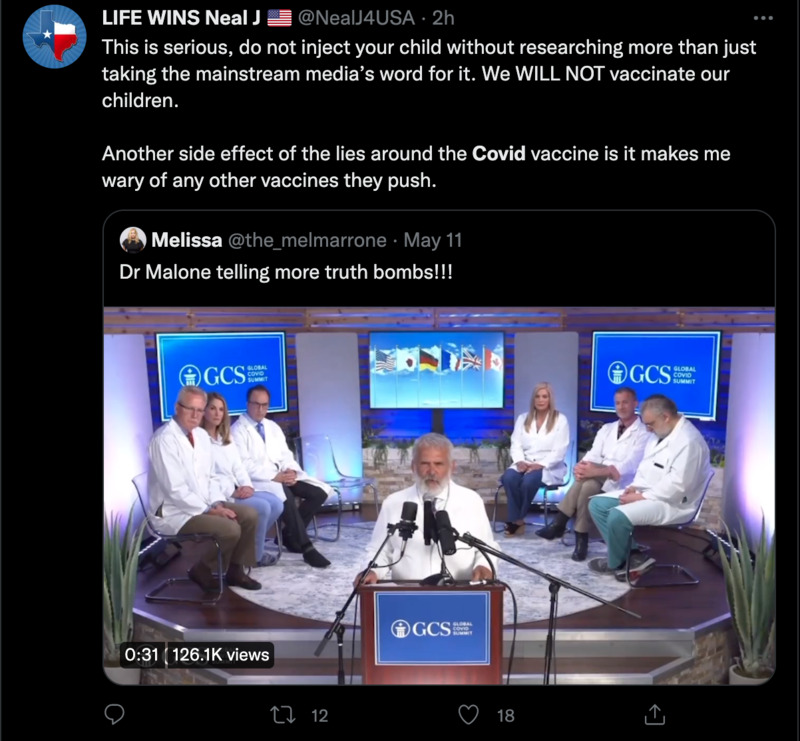 2022-06-25
2022-06-25Do not inject your child without research
This is a tweet from NealJ4USA. This person has decided not to vaccinate their children after having done some research on the subject. Due to distrust in the COVID vaccine, it is also making this person feel more hesitant about any other vaccines that end up getting pushed.
